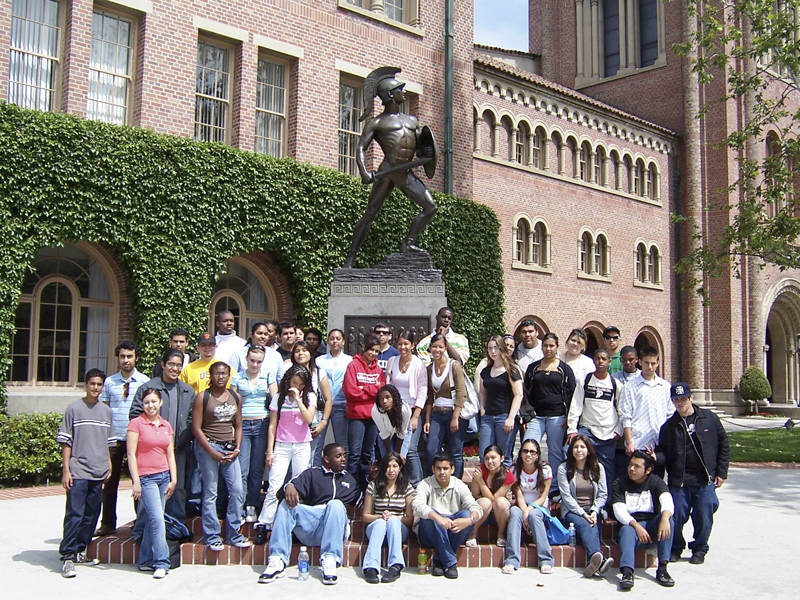
If you were never presented with the option of attending college, do you think you would? Statistics don’t lie: Having a college education is preferable to not having a college education. America’s current unemployment rate is at 6.7 percent. Close to 8 percent of all working non-college graduates are unemployed — but only 4 percent of college graduates are.
I personally know I wouldn’t be a current college student majoring in political science if my parents, teachers and fellow students hadn’t pounded the idea into my head until it became the only thing I could think about. Everything that we had planned for, and the hard work we put into our lives, had ultimately come to applying for colleges. And I am thankful for the circumstances that have guided me where I am now because I’ve come to realize how vital a graduate education is in today’s world.
But while I am cognizant of the statistics, and more importantly, the individual reality of trying to enter the workforce with only a high school diploma, too many other students have never been, and will never be if they’re not also given the same insight. I was fortunate enough to have parents who attended college, were aware of its infinite advantages and were willing to push me toward continuing my educational career.
But too many other students don’t have the same support structure or the same understanding of the benefits of a college education. These students can come from anywhere in the country, but more generally are from the more disenfranchised areas, where the culture does not tout college as an image of success. And because of this, these students don’t have the same opportunities to work toward a higher education.
Everyone deserves the opportunity to attend college. Whether or not they have the means to do so, shouldn’t they at least be aware of the opportunity to continue their education?
Certain high school alumni within California believe so.
These individuals have graduated from college themselves and are returning to the high schools they attended to host college workshops. Within them, they educate students and parents alike about how to begin working toward college in their high school career, how to attain the means of affording it, how to apply when the time comes, and ultimately, why students should consider going. Comparable to the goals of these returning high school alumni, UCR’s Early Academic Outreach Program (EAOP) seeks the same results by participating in similar activities across the Inland Empire, all aimed at educating students on why they should consider a college education, and further, how they can achieve it.
However, these programs and individuals face criticism. Some argue that these workshops incorrectly guide students toward an unreachable goal, toward something that is not right for them. The criticism claims that sometimes these workshops mistakenly inform students only of universities that may be too expensive for them to attend, or otherwise, schools that may even be too hard to be accepted into. Secondly, they argue that the seminars only target high school seniors whose time to apply and be accepted into colleges has passed, and thus, that they are impractical.
I would concede that, for such programs to be effective, they will need to revolve around students who still have the opportunity to steer themselves and their education toward college. Critics claim that these workshops are futile, and the students they are designed to aid cannot use the information they gained. But in many cases, students return to acquire a college degree even after they’ve entered the workforce. These workshops may very well influence a high school senior to return in one or three more years to pursue a higher education. But adjustments may be needed if they aim to push students toward going to college right out of high school. If the seminars are presented to students early on in their high school career, they may very well steer students to apply the lessons they learned to the remainder of their formative years. When application season rolls around, they will already have the academic resume to propel their academic career into college.
Regardless, what these alumni are doing, and similarly, the actions of UCR’s EAOP, are measures that should be supported and made more prevalent. Because of them, students all over the country are realizing opportunities they never knew existed.
Of UC Riverside’s undergraduate student population, first-generation college attendees comprise 50 percent of admitted freshmen in 2013. That’s nearly half of the student body. More young adults in our generation are attending college than in previous generations. That translates into a maturing generation of college attendees and graduates who will enter into the workforce with four or eight or more years of experience working in their desired field, and who will then have the opportunity to contribute and grow.
Even if only a hundred, if only 10 or even just one student is moved by these programs to want to carry on their education at college, that’s one, or 10 or a hundred educated young adults that have the opportunity to achieve goals they never before thought they could. And because of this, these programs are a success.
Everyone deserves the opportunity to learn, to contribute or to grow. College gives individuals the chance to do all three. And whether or not you’re in favor of high school students moving on to a higher education, at the very least, shouldn’t everyone be aware of what they can achieve through college? Only after knowing all the options can one truly decide how they want to continue their life, and perhaps most will find that the attainment of their goals comes most readily through a college education.








